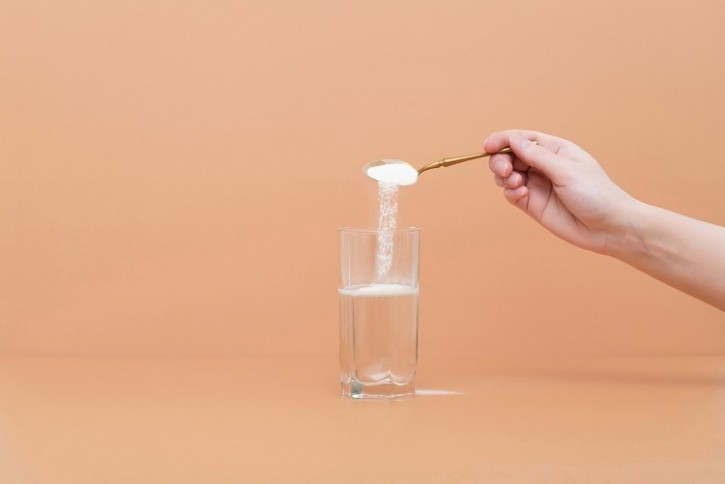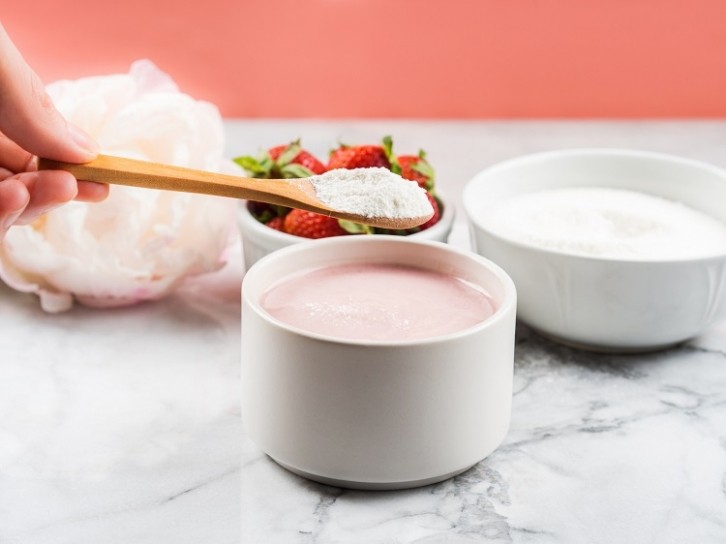The collagen market is on the rise, with worth anticipated to extend from $5.1bn (€4.69bn) in 2023 to $7.4bn by 2030, in keeping with market analysis firm Markets and Markets. The overwhelming majority of collagen available on the market serves the nutraceutical, sports activities vitamin and beauty industries. Examples of collagen in food and drinks merchandise exist, however to a a lot lesser diploma.
Collagen is essentially the most ample protein within the human physique, making up 80% of the ligaments, cartilage and tissues of our pores and skin. At across the age of 30, people cease producing collagen, which might improve the danger of harm and result in the looks of wrinkles.
To assist high up provide, customers flip to collagen sourced from animals resembling cows and fish. However lately, innovators have been rethinking collagen manufacturing with environmental sustainability and animal welfare in thoughts. Some are turning to mobile agriculture to provide ‘actually an identical’ collagen in a lab. Others are leveraging crops to mix amino acids discovered inside human collagen.
With collagen a rarity in food and drinks, are these innovators rethinking manufacturing for tablets, protein powders, and pores and skin lotions solely? Or ought to customers be ready for animal-free collagen to make a splash of their favorite snacks and refreshments?
How is animal-free collagen made and does it work?
We reply these questions and extra within the Half 1 of our deep dive into animal-free collagen, accessible to learn right here.
The sustainability credentials of animal-free collagen
Animal-free collagen, whether or not comprised of animal cells or crops, purports to be extra environmentally sustainable than its standard counterpart. However precisely how a lot ‘greener’ is animal-free collagen?
Belgian producer VeCollal will not be producing collagen within the strictest that means of the phrase, however as a substitute makes use of crops to make ‘biomimetic’ variations of human collagen sorts. “As VeCollal has largely sugarcane as the bottom materials utilized in fermentation, the footprint is much inferior than the bottom materials for animal collagen, which is often the hides of cows,” defined founder Tony Van Campen.
Evaluating the CO2 footprint of those two base supplies suggests VeCollal’s is related to simply 15% of that utilized in bovine collagen manufacturing. “This could come as no shock both,” pressured the founder. “It’s common data that cattle manufacturing or fishing has an enormous impression on the surroundings.”
Over within the US, cell-based collagen maker Jellatech has plans to conduct a life cycle evaluation to evaluate the product’s environmental impression cradle-to-grave, however will not be there simply but. “We anticipate a constructive environmental impression, notably in decreasing greenhouse gases,” founder and CEO Stephanie Michelsen advised FoodNavigator.
“This stems from decreased dependency on animals for a wide range of purposes. Our objective will not be solely to enhance planetary well being, but additionally enhance the wellbeing of people and animals – all whereas decreasing the assets required.”
Demand for collagen has ‘surged’, however will it edge into food and drinks?
Collagen is believed to enhance the well being of pores and skin, hair, nails, joint and bones, and assist enhance muscle restoration. Seen by way of this well being lens, it’s maybe unsurprising the ingredient is generally present in dietary supplements, protein shakes, pores and skin cream and even haircare.

However business is observing a shift as collagen tentatively makes its means into snack bars and infused water merchandise. “Because of growing shopper consciousness on the impression of vitamin on ageing, sports activities efficiency, and general well being and wellness, the demand for collagen has surged,” stated Jellatech’s VP of enterprise improvement Jaclyn Shingara.
“You may even see collagen as a dietary or well being complement within the type of a hydrolysed powder, or its by-product gelatin as a texturiser ingredient in confectionery items, meals casings, and rather more.
“Collagen is used way more extensively than we’d realise.”
Within the UK, ProTec Nutra – which makes a vegan collagen from non-GMO corn – is equally seeing an increase in food and drinks purposes. Yoghurts, milks and drinks appear to be the brand new pattern for collagen fortification and distribution, product supervisor Josh Perry defined.
Based on Innova Market Insights, 30% of worldwide customers want to eat dietary supplements in food and drinks merchandise. It is a pattern ProTec Nutra expects will proceed to develop.
“Over the past a long time, we have now seen a pointy rise in collagen containing merchandise,” concurred VeCollal’s Van Campen, citing merchandise accessible available on the market together with collagen cookies, collagen bars, collagen pancakes, and collagen espresso creamers.
How will the animal-free collagen sector evolve within the coming years?
As as to if makers of animal-free collagen are particularly focusing on the food and drinks market, the plant-based producers we spoke to are at present promoting into each meals and nutraceutical industries.
Within the short-term, cell-based collagen maker Jellatech predicts the well being market might be its first port of name. However CEO Michelsen instructed this will likely change down the road. “Whereas our preliminary focus is on purposes associated to human well being, we have now thrilling plans to broaden our attain as we scale our know-how and streamline prices.
“Enlargement into meals and beverage is only a matter of time.”
All are satisfied animal-free collagen has huge potential in food and drinks, predominantly pushed by a necessity to maneuver away from resource- and carbon-intensive manufacturing strategies.

Different means of manufacturing collagen can have a ‘huge impression’ by attaining the ‘identical output’ whereas assuaging the burden on the surroundings, Jellatech’s Shingara advised us. “Whereas eliminating all animal tissue-derived collagen will not be sensible (acknowledging the availability of uncooked supplies that may in any other case be wasted), there are purposes the place animal-derived collagen falls brief in fulfilling particular wants.”
For comparable environmental and animal welfare causes, ProTec Nutra believes all issues plant-based will proceed to develop. As does VeCollal, significantly given the Belgian operator can show ‘it truly works’.
“Prior to now, options available on the market had been robust in advertising and marketing and weak in science…If the patron learns and understands that they will now have all the advantages of animal collagen and extra by way of a product that’s extra sustainable, vegan and allergen-free, then the longer term is unquestionably very shiny,” stated Van Campen.
“It’s our business’s job to show the efficacy and clearly differentiate from the snake oil and scammy merchandise which have misled customers previously.”
Highlight on regulation: Not all animal-free collagen is permitted for market entry
After all not all collagen various merchandise are available on the market. Jellatech’s cell-based providing, for instance, is taken into account a novel ingredient requiring pre-market approval previous to commercialisation.
This will not be as difficult because it sounds, nonetheless. In contrast to mobile agriculture applied sciences that harvest the cells themselves, Jellatech’s strategy extracts and purifies complicated proteins from the cells. “Our methodology is much like how proteins are at present purified from animals, with the notable distinction that we will exactly management the surroundings upstream of the extraction,” defined the corporate’s CEO.
It may very well be argued that Jellatech’s collagen faces a probably smoother path to regulatory approval that precision fermentation-derived dairy, Michelsen instructed. “That is attributed to its purification (lack of mobile materials) and bio-identical nature mirroring collagen extracted from animals – a follow safely embraced for a few years.”
The corporate pressured it’s ‘dedicated’ to making sure its collagen meets all regulatory necessities.

